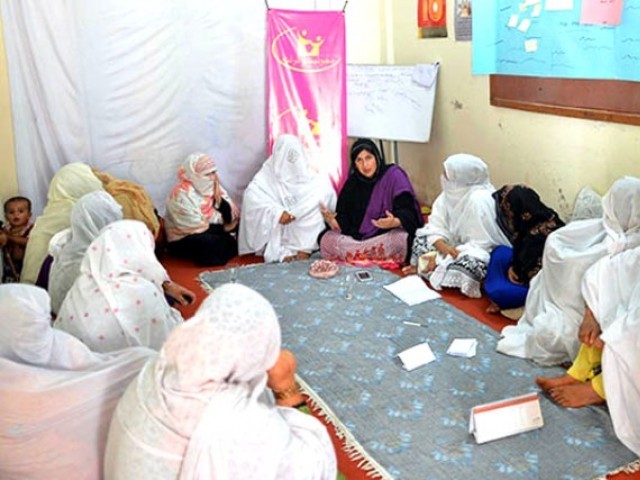By Rabia Ahmed
Express Tribune

The Khwaindo Tolana organised protests on Tahira’s parents’ behalf and pushed the authorities into registering her case, forcing the murderer to flee, a distinct improvement on the male modus operandi. PHOTO: AFP
The best environment for terrorism is ‘poverty, injustice, racism, and deprivation of human rights,’ factors identified byMalala at the UN on June 12. Pakistan, where terrorism is a major force, has them all. Malala, a living example should know, and obviously her defiance emboldened other women, since all four factors are rampant in Malala’s district, Swat, where the men are known for male chauvinism, like a dragon is also known as a worm.
Tahira, married at 12, suffered marital abuse. There’s nothing unusual about either the child marriage or the abuse, they happen all the time. One day her husband threw acid on her, which also happens pretty often. Most victims manage to survive (although many die). Tahira died a horrific death after days of agony.
Why was Tahira married at that age? Why was she not in school? Why did no one help her? And why, after she died, did the regular authorities refuse her parents’ plea for justice, or even register the case? Such are the manifestations of a government that does diddlysquat.
Government courts take years to settle cases, so Tahira’s parents took the case to their local jirga composed of men, who said that Tahira’s parents should marry their son to Tahira’s murderer’s sister. Mercifully, a women’s jirga had recently come into being, mobilised by an NGO in Swat. It calls itself the ‘Khwaindo Tolana’, meaning the “Sister’s Group”.
Naturally the male jirga does not recognise its female counterpart, which wholeheartedly returns the compliment:
“We’re fed up with male-only jirgas that decide only in the favour of men and sacrifice women for their own mistakes,” said Tabbassum Adnan, who heads the female jirga.
Just how many legal systems can co-exist before things become chaotic, or in our case, even more chaotic?
We already possess a judicial system that is supposed to deal with such matters. Unfortunately, it focuses on issues that focus the spotlight on the individual and supreme components of that judiciary to the great elation of the masses.
There’s the Taliban method. Up north, for want of the real thing, they call it justice. The Taliban’s years of power in Swat saw a liberal deployment of whips, daggers and gallows, often applied to the wrong person, too often female. Rough, swift and ready ‘justice’ and then life went on. No knocking on official doors or making endless rounds of courts.
And finally, jirgas, the third system, the cultural one.
This is what happens when demand exceeds basic facilities, or as in Pakistan, when basic facilities are simply not there.
In some countries midwives tackle routine cases of childbirth, freeing more hospital beds for others. However, these midwives are trained, and they refer complications to the proper quarters. Members of a jirga could be similarly trained to take over slack from the courts for your average case of cattle theft etc. An untrained jirga is like a grandmother prescribing clove oil which may help your aching tooth but that is all; beyond this, would you rather a trained dentist extracted the tooth, or would you still prefer your grandma’s sarotha?
So the questions are: what are the qualifications of these people in jirgas? Who are they, and what is their remit?
I write in the hope that I am wrong. I hope the women of this jirga whose courage I truly honour will achieve great things. However, in this conservative society known for its militant interpretation of religion, women are not normally too educated, if at all; witness Malala, her campaign and her fate.
The women of this jirga belong to the same community as the men. It is not a huge place, so they are likely to be connected to the men in some way. Therefore, however sympathetic they may be, how different can the women’s understanding of justice be, keeping in mind the men’s verdict in Tahira’s case? Besides, justice is not about sympathy, it is about being just.
Also, besides, these women may often themselves be victim, judge and jury, yet justice must be impartial. How can a woman be so, if her own child was shot/bludgeoned/burnt to death, or is alive yet abused and her mother must give a verdict in a similar case? Or adjudicate regarding another woman who killed the murderer of her child?
Perhaps the women’s jirga operates differently to the men’s. It is certainly a platform for the women of the area, and fills an immense void.
The Khwaindo Tolana organised protests on Tahira’s parents’ behalf and pushed the authorities into registering her case, forcing the murderer to flee, a distinct improvement on the male modus operandi.
However, AFP observes that given the conviction rate in Pakistan, it is unlikely that this jirga’s decisions will be carried out. So this group has the power to punish.
Should it? Remember granny, her sarotha and your aching tooth.
Most importantly, what’s the alternative?
